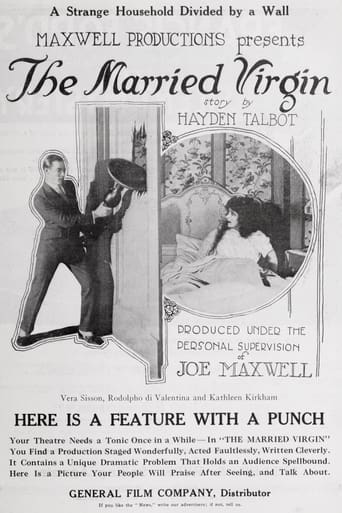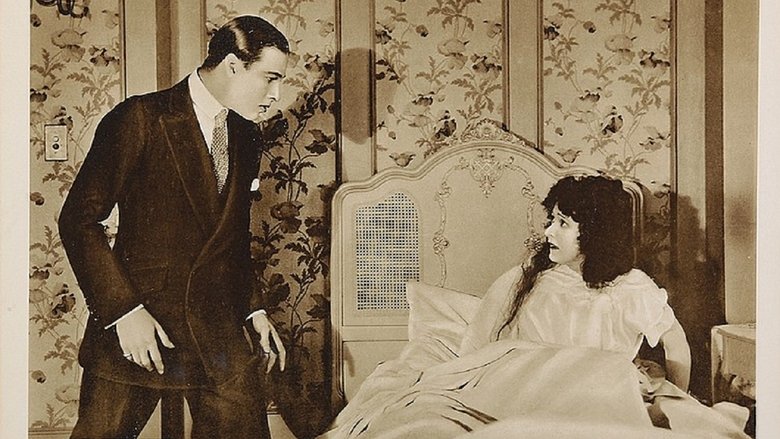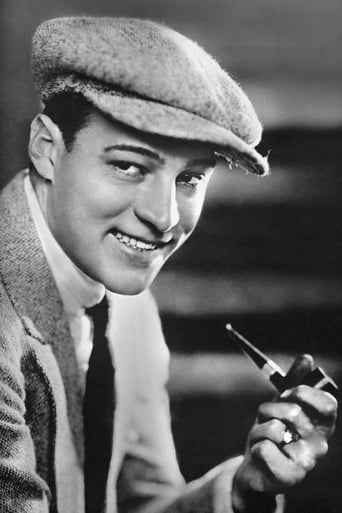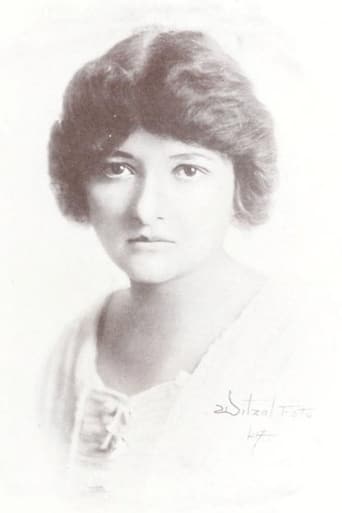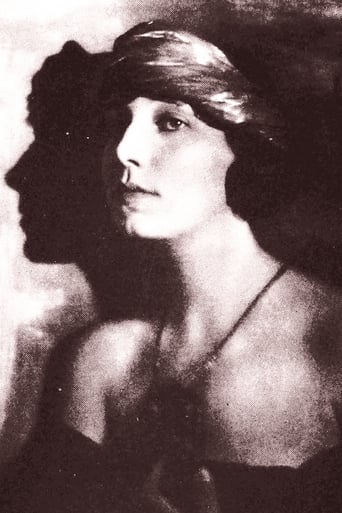The Married Virgin (1918)
In order to save her wealthy father from disgrace and a possible prison sentence, a daughter agrees to marry the gigolo who's been blackmailing him...
Watch Trailer
Free Trial Channels
Cast


Reviews
Tied for the best movie I have ever seen
Intense, gripping, stylish and poignant
The movie's only flaw is also a virtue: It's jammed with characters, stories, warmth and laughs.
I think this is a new genre that they're all sort of working their way through it and haven't got all the kinks worked out yet but it's a genre that works for me.
Rare, earlier Rudy Valentino film from 1918, and one where Rudy gets to play a truly evil character. As the Count Roberto Di Fraccini, he is a fortune hunting gigolo, who uses his sex appeal to seduce a young virgin into becoming his wife. He cares nothing for the innocent girl, but has an eye on her vast inheritance. When blackmailing her father doesn't work, the Count and his lover, (the young girl's mother-in law no less!) devise an evil plan.High drama, broken hearted damsels, and villains; it's what the Great Era of Silent Cinema was all about. Valentino might have shown more brightly in later, more high profile films like "Four Horsemen of the Apocalaypse" and "Blood & Sand," but here is a chance to see him in a more stark, and edgy performance. It's wonderful that this early film has survived through the years, and has even had a DVD release. "The Married Virgin" is absolute essential viewing For Valentino fans. Another reviewer commented on the 'choppy script' and inconsistencies, but I saw none. Maybe this person saw a different, or incomplete cut of the film. I thought this was near perfect..and it took years for me to acquire this title, but it was worth the effort.
"The Married Virgin" is a bad movie by the standards of any era or genre. The only reason it has received a DVD release from a top company is that it features Rudolph Valentino—before he was a star. In it, he plays a swindler who has an affair with a married woman, and they try to blackmail her husband and his daughter. The film doesn't get much from the otherwise promising concept of an actor playing a character pretending to be another character. In one scene, Valentino's intertitles state, "You pay me a great compliment. I had no idea my acting was so convincing - - - but surely you know it is a performance." Unfortunately, not Valentino or anyone else in this film gives a convincing performance. At least, he and Vera Sisson (who is probably the actual lead here) are tolerable, which is more than can be said about the awful acting of those playing the stepmother and father.The melodrama is overwrought and boring. By the end, it doesn't even make much sense. The marriage part of the blackmail is unnecessary. Why would the father be more willing to pay off a blackmailer through the marriage of his daughter and subsequent "settlement" rather than just giving him the money and not dragging his daughter through such an ordeal? Additionally, in a large offense of telling instead of showing and manufacturing a happy ending out of nowhere, a single title card exonerates the father of his crimes; a man, who throughout the film, we had been told was guilty of murder and graft. The title claims, "Actually innocent, McMillan knows he must flee the state to escape a political frame-up."There is also some jarring continuity editing—throughout the film, cuts just seem to be a bit off. I doubt that has much to do with the restoration of this film given the professionals who did it. "The Married Virgin" was a B-picture of its day, made by a production company that I hadn't heard of. Somewhat interesting in the film is the employment of a flashback inside a flashback in one sequence, and there's a through the mirror shot of a character in another scene.
I saw this on a DVD that was part of a collection of Valentino films. Valentino does not appear for the first ten minutes, so I jumped to the conclusion that he played a bit part and the video makers were just adding it as fuller. When Valentino did come on, I found that I was wrong. He does have a substantial part and gives a very strong performance.One thing that is really weird about the film is that Kathleen Kirkham plays the mother-in-law to Vera Sisson. Yet Kathleen was 23 years old and Sisson was 27 years old when the film was made. Kathleen is quite good in the movie. She shows a great deal of passion for Valentino.The film is nicely shot and edited with a good and effective use of close-ups to emphasize details. Especially noteworthy is a flashback within a flashback, something I have rarely seen in a film before. Kathleen tells Valentino about a time when she overhead a blackmailer talking to her husband. We flashback to the scene with the blackmailer. The blackmailer tells the husband (Edward Jobson) that he saw the husband murder a man. We then flashback to the murder of the man. We then return to the blackmailer and the husband, followed by a return to the present time and the wife talking to Valentino. It reminded me of the nesting structure of Mary Shelley's "Frankenstein." Nearly every scene reveals great details about the time period, the cars, the mansion with the diverging staircase, a game of tennis with small rackets, even the clothes worn to the beach are fascinating to watch and capture the time period wonderfully. It gives us a nice idea how the upper class lived at this time.The plot is not outstanding, but I think it represents a well done period melodrama involving a European Count who ruins a rich man by first seducing his young wife, then blackmailing him and finally forcing his daughter into marriage. The Count proves that he is a gentleman after all by not forcing his new bride to have sex with him, but saying that he will wait until she wants to. Thus she remains a "married virgin".If it did not contain Valentino, the film would be merely interesting, but Valentino's assured and well acted performance makes it quite enjoyable.
Primitive, as one reviewer describes this film, is generous, this movie is really pathetic. The story is only driven along by the titles, after each one of which some poor excuse for a filmed scene "illustrates" what we've just read. It's the most ineptly conceived silent I've ever seen. Personally I think the best performance comes from the little lady. The stepmom's is quite odd, and I didn't get any "spark" between her and Rudy, as another reviewer did. I can't imagine this movie would have played well even in 1918. What is really kind of remarkable is that come time for the happy ending, not only does evil Rudolph get away scot free (Why? One wonders. Padded with so many superfluous bits mini flashbacks and "here's what she imagined would happen"s, it would have been simpler to use that wasted time to deal "the Count" some deserved fate.), but the really shocking thing, even for a pre-coder, is that dear old father-of-the-bride is never held accountable for a cold-blooded murder he'd committed early in his career. Absurdly, the audience is even asked to believe that this craven cow is innocent of more recent corruption charges. Evidently at all costs we can't have this "nice" old fool thrown into the pokey. In the end the happy couple rejoices at the woman's having gotten her marriage to "the Count" annulled. Funny that for the ill-playing pains to which the writer went to make the conclusion clear even to people unfamiliar with the concept of "annulment", it seems that unfortunately the author misunderstood the meaning of the word "wedlock". Maybe he'd seen dogs mating? At any rate he appears to have taken the word to mean "intercourse"!

